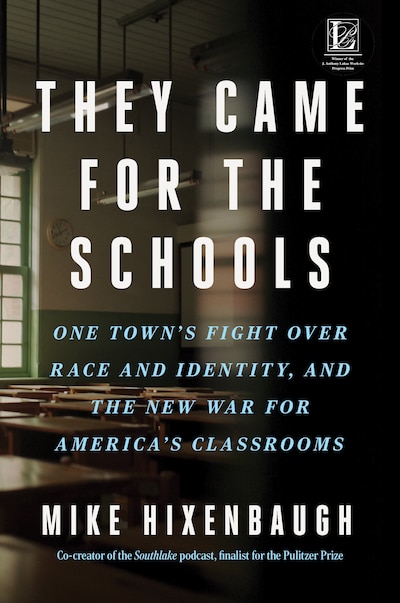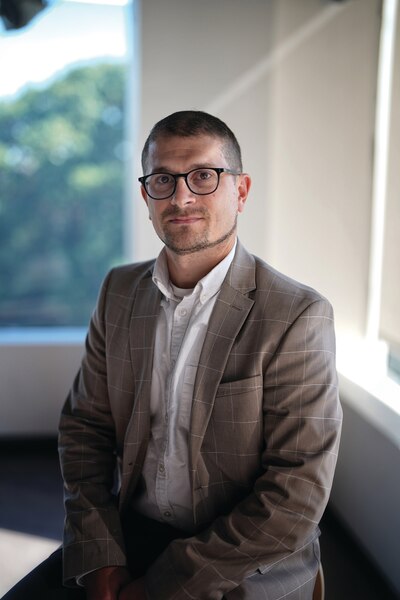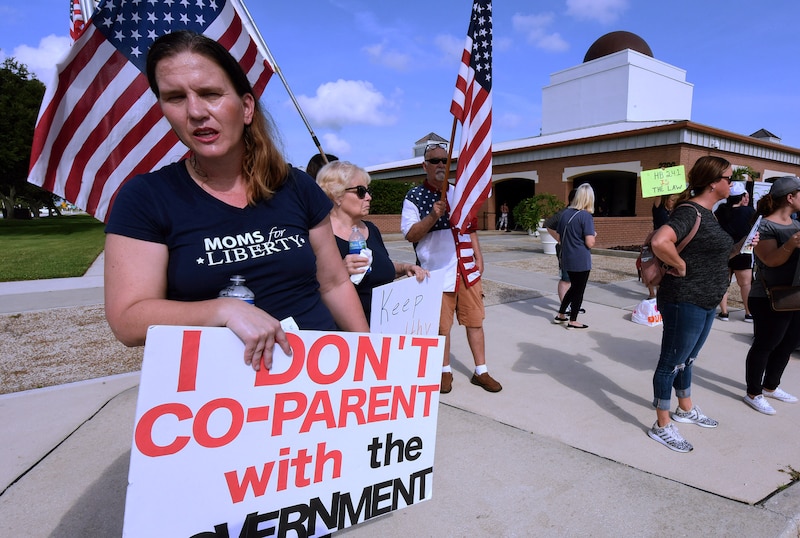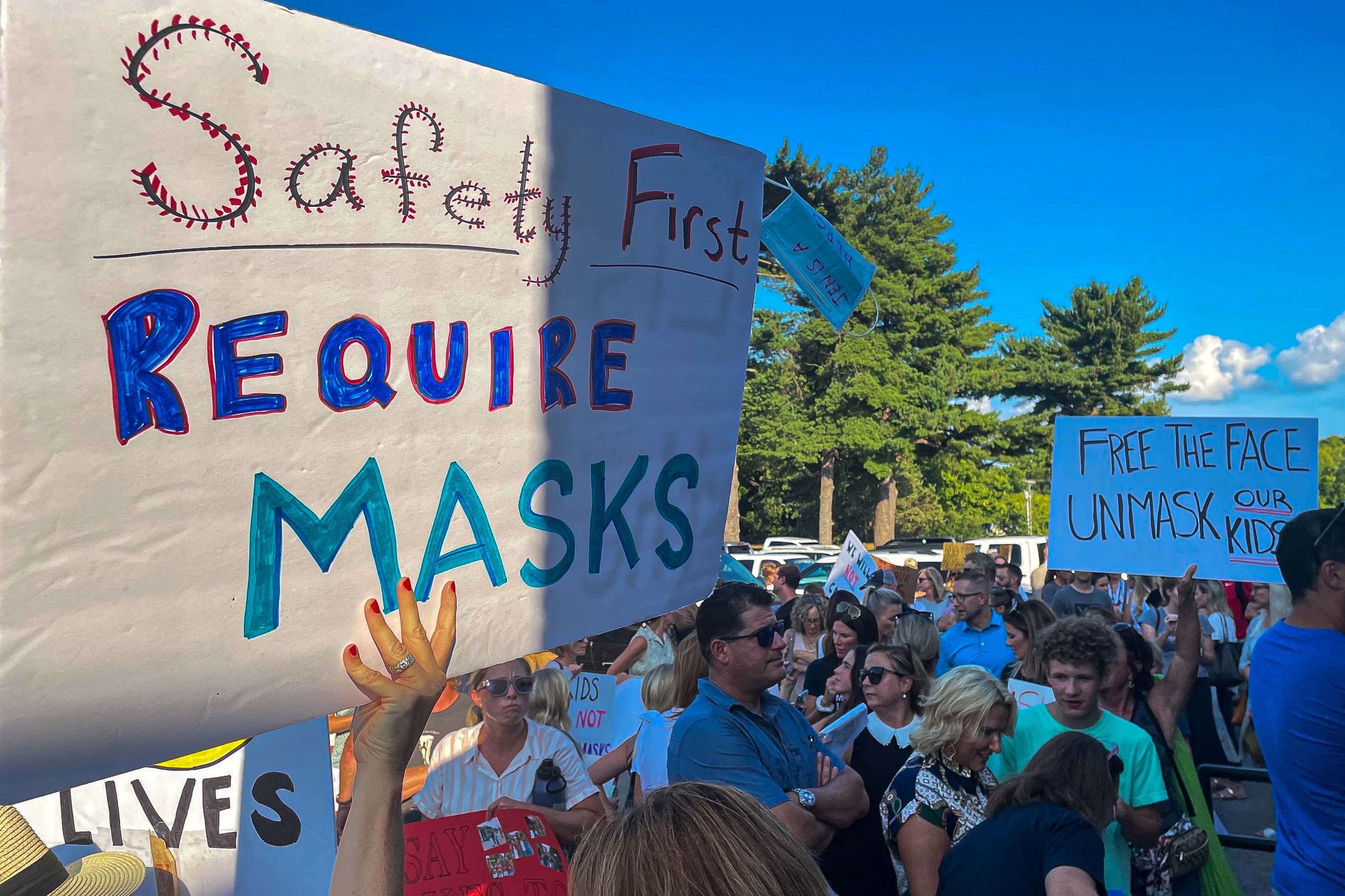The following is adapted from “They Came for the Schools: One Town’s Fight Over Race and Identity, and the New War for America’s Classrooms,” a book by NBC News senior reporter Mike Hixenbaugh set to be published by Mariner Books on May 14.
Three years ago, a conservative uprising swept through the wealthy, North Texas city of Southlake.
The impact of that local movement has since rippled well beyond the suburb’s borders — helping bring divisive political strategies to nonpartisan school boards across the country and quietly influencing what children are taught about race, gender and sexuality. As these conflicts continue to roil communities, the story of what happened in Southlake — and how it inspired conservative activists nationwide — reveals what’s at stake as voters consider competing visions for America’s schools in the 2024 election.
Southlake’s fight began after a series of racist incidents spurred local officials to roll out a plan to make the affluent Carroll Independent School District more inclusive. Then came the backlash.
In 2020, parent activists — outraged at what they depicted as anti-white and anti-American indoctrination — formed a political action committee called Southlake Families PAC, which promised to end diversity programs and elevate “Judeo-Christian values” at the suburban Carroll school district. They raised hundreds of thousands of dollars to support a slate of hard-line conservative candidates, launched attack ads accusing their opponents of being radical leftists and, in 2021, won control of the Carroll school board.
The landslide victories caught the attention of conservatives nationally.

Afterward, The Federalist, a conservative online magazine, compared Southlake’s political revolt to the early days of the tea party movement in 2010, when anti-Obama blowback propelled a new generation of far-right Republicans into power. “Only this time,” the magazine wrote, “the stakes are far higher, with conditions ripe for a new takeover.”
The Wall Street Journal editorial board praised the outcome in an op-ed titled “Southlake Says No to Woke Education,” writing, “Perhaps parents in other parts of the country will take the lesson that they can resist indoctrination that tells students they must divide and define themselves by race and gender rather than focus on learning and achievement.”
Laura Ingraham opened her nightly Fox News broadcast on May 3, 2021, with big news out of a small town in Texas. The clear message from Southlake, she told viewers of the “Ingraham Angle,” was: “We’re winning.”
Ingraham, like other Fox hosts, had spent months calling on her audience to fight the rise of Black Lives Matter and critical race theory in American society. “More of you are smartly heeding that call, because in Saturday’s election in Southlake, Texas, candidates opposed to the far-left BLM curriculum won the two open seats on the Carroll Independent School District board with nearly 70% of the vote.”
It may have been the first time that a Fox News prime-time program led with the results of a local school board election. Six months after former President Donald Trump’s 2020 election defeat, conservative pundits appeared hungry for something to celebrate — some indication that the political winds were shifting ahead of the 2022 midterms. After years of selling their viewers a dark vision of America besieged by sinister forces from the left, the Southlake story appeared to present the bosses at Fox News with an opportunity to feed their audience something markedly different: hope that their side would prevail.
Activist Chris Rufo, the man most responsible for turning critical race theory into a conservative battle cry, was so excited by the outcome in Southlake that he apparently failed to fact check his celebratory tweet: “In 2020, Joe Biden narrowly won this district. Today, anti-woke candidates won by 40 points,” Rufo wrote, conflating Southlake’s 2020 presidential results — which skewed heavily for Trump — with those of the broader, more moderate Tarrant County, whose electorate had swung narrowly for Biden.
Nevertheless, Rufo’s point was fast becoming conventional wisdom on the right: Southlake, the argument went, held the answer for how Republicans could regain the ground they’d lost over the years in fast-growing and rapidly diversifying suburbs nationally. Republicans believed they could motivate voters by recasting nonpartisan school board elections as fights for the soul of America.
Days later, former Trump adviser Steve Bannon declared on his War Room podcast: “The path to save the nation is very simple — it’s going to go through the school boards.” That summer, the Center for Renewing America, a leading think tank in a conservative consortium that’s now preparing for a second Trump administration, published a 33-page handbook for taking control of school boards, holding Southlake Families PAC up as a model.

The sense that the strategy was a winner for conservatives nationwide was also the headline message that spring when the leaders of Southlake Families PAC threw themselves a victory party at the home of Leigh Wambsganss, a longtime local conservative activist and one of the political action committee’s co-founders.
The chairman of the Texas GOP, Allen West, had come to celebrate their success — and issue a challenge.
“This is a best practice,” he said. “This is a lesson learned. You have to put this in a white paper. You have to make a video. You’ve got to make sure that you export this to every single major suburban area in the United States of America.”
West paused between those words for emphasis: Every. Single. Major. Suburban. Area. In the United States.
In August 2021, 17 months after the initial shutdowns to prevent the spread of Covid, a disturbing scene unfolded in a darkened parking lot outside a school board meeting in Williamson County, Tennessee, a wealthy and predominantly white community in the suburbs south of Nashville.
As the Delta variant of the coronavirus burned through the population that summer, filling hospital beds across the nation, the school board in Williamson County had made the politically divisive decision to follow the advice of public health experts and reinstate the district’s mandatory mask policy for the upcoming school year.
After the vote, an angry crowd swarmed mask proponents as they headed to their cars. “Take that mask off,” a woman shouted, getting into the face of another resident. Later, two men followed a mask-wearing official to his car, shouting, “We know who you are!”
“You can leave freely,” one of the men yelled, “but we will find you!” The other man made the threat more explicit: “You will never be allowed in public again!”
Video of the altercation went viral on social media, becoming the latest in a line of chaotic school board meetings to make headlines that summer, as conservative parents nationwide revolted against pandemic safety measures and lessons on racism that they attacked under the right’s ever-expanding definition of critical race theory.
Similar scenes had played out in Loudoun County, Virginia, where parents opposed to a district diversity plan shut down a meeting chanting, “Shame on you!” and in Rockwood, Missouri, where a school superintendent felt compelled to hire private security to stand guard outside the homes of Black senior administrators responsible for overseeing the district’s diversity and inclusion programs.
School board meetings grew so volatile that summer and into early fall that the National School Boards Association wrote a letter to President Joe Biden requesting help assuring the safety of school employees and board members. Attorney General Merrick Garland followed up by sending a memo to the FBI and federal prosecutors noting a “disturbing spike in harassment, intimidation, and threats of violence” against school officials, and directing agency leaders to come up with strategies to address those concerns.
Conservative activists seized on the missive to spread a conspiracy theory that the Justice Department planned to target parents opposed to critical race theory and to prosecute angry suburban moms as “domestic terrorists.”
Many conservative parents embraced that title as a badge of honor that summer as they rallied around new national groups like No Left Turn in Education and Moms for Liberty that had formed to take the fight to school boards.
Robin Steenman had launched a Moms for Liberty chapter to oppose the mask mandate and lessons on racism in Williamson County, the site of the ugly parking lot showdown. An Air Force veteran and white mother of three, Steenman’s own children did not attend public school, but as a taxpayer in the Nashville suburb, she was determined to rid the district of any lessons or curriculum that she believed focused too heavily on the history of racism in America.

Although Steenman said she admired Martin Luther King Jr.’s call to judge others based only on the “content of their character,” she and her supporters wanted the district to ban the children’s book “Martin Luther King Jr. and the March on Washington,” because it contained historical images — including depictions of white firefighters blasting Black people with hoses — that might make white children feel bad about themselves.
“There’s so much positive that has happened in the 60 years since,” Steenman told a Reuters reporter, referring to several historical books she wanted removed. “But it’s all as if it never happened.”
The district refused to remove the books, arguing that they presented important historical facts in a clear, age-appropriate format. Later, the school board agreed to minor adjustments in the way teachers presented some of the material, but that did not appease Steenman, who’d come to believe that speaking at board meetings and writing stern letters wouldn’t be enough to effect real, lasting change.
If she and her supporters were going to take control of their public schools, they would need to harness the anger on display at public meetings that summer to win seats on the school board itself.
To do that, Steenman looked to the example set in a Texas town some 700 miles away.
In October 2021, five months after Southlake Families PAC’s landslide election victory, Steenman filed paperwork to form a new political action committee of her own. She and her allies named it Williamson Families PAC and quickly launched a website, which featured a mission statement taken nearly word for word from SouthlakeFamilies.org.
“Williamson County is built upon the rock of Judeo-Christian values that are the foundation of our country. We welcome all that share our concerns and conservative values.”
Steenman confirmed her inspiration in an interview with The Tennessee Star, a conservative online news site: “Williamson Families is a recipe that’s been done before. It was done in Southlake, Texas,” she said. “So I said, ‘Wow, that really works. That could really work here.’”
Like Southlake Families, Steenman’s political action committee held a kick-off celebration. Instead of Allen West, theirs featured John Rich, a popular country singer known for supporting Republican politicians. And like the Texas-based PAC that inspired it, Williamson Families quickly raked in nearly $200,000 and set its sights on recruiting candidates for the following year’s school board elections.
As in Southlake, Steenman and others on the PAC privately interviewed prospective candidates, looking to weed out those who were insufficiently conservative. The Williamson County-based PAC also hired a heavy-hitter GOP consulting firm called Axiom Strategies — the same firm advising Southlake Families. Axiom, known for its work on Republican Sen. Ted Cruz’s presidential campaign and Glenn Youngkin’s campaign for governor that fall in Virginia, was now in the business of bringing sophisticated, national-level political strategies to local school board races.
Williamson Families PAC succeeded in turning the local election into a high-stakes partisan battle that deeply divided the community. But it fell short of its goal of taking control of the school board in the spring of 2022, winning just two of six open seats.
The Southlake Playbook, it turns out, wasn’t the universal winner that Republican strategists had hoped for. Suburbs that favored President Joe Biden in 2020 have tended to reject anti-diversity school board candidates; those favoring Trump, as in Southlake, have tended to embrace them. And some moderate conservatives — the people Republican strategists had hoped to win back — have been turned off by right-wing attacks on public schools.
Nevertheless, Steenman and her allies in Williamson County promised to continue fighting.
And she wasn’t the only white suburbanite inspired by Southlake.
From 2021 to 2023, Ballotpedia, a nonpartisan political encyclopedia, identified more than 2,000 school board elections where candidates took a stance on the battles over racism, LGBTQ inclusion or pandemic safety measures.
Just as in Williamson County, new Southlake Families-inspired political action committees began sprouting up across the country to push some of these candidates to victory.
A group seeking to block diversity lessons in Spalding County, Georgia, formed a PAC with a mission statement including the same copied-and-pasted phrase, “unapologetically rooted in Judeo-Christian values,” and noting that the group would “welcome all that share our concerns and conservative values.”
McKinney First, a political action committee formed to root out critical race theory in another North Texas school system, included identical language on its website. To stop the spread of CRT in the west Houston suburbs, there was Spring Branch Families PAC. North of Austin, politically connected parents formed Lake Travis Families PAC.
Nearly a dozen PACs formed that year in the Dallas-Fort Worth suburbs alone — so many that a liberal Fort Worth newspaper coined the phrase “the Southlake Playbook” to describe the surge of conservative organizing around local nonpartisan school boards.
These clashes have had a real impact, even in districts where hard-line conservatives have failed to win control. Fearing community backlash, two-thirds of teachers nationally reported limiting instruction about political and social issues, including racism and LGBTQ topics, according to a recent survey by the Rand Corp.
Wambsganss, the Southlake Families co-founder, would go on to replicate her own strategy in several other Texas school districts while overseeing a PAC funded by a far-right Christian cellphone company called Patriot Mobile. She reported receiving more than a thousand emails after the initial Southlake Families PAC election triumph, many from conservatives looking for tips on launching their own hyper-local political action committees.
Conservative activists in the affluent majority-white suburbs west of St. Louis were among those reaching out. Organizers there said they consulted directly with Southlake Families leaders before creating Francis Howell Families PAC in 2021 with a mission of supporting school board candidates who would ensure that schoolchildren learned “respect for our nation’s founding principles.”
After they won control of the school board, the Francis Howell Families-endorsed candidates once again followed Southlake’s lead, voting to rescind an anti-racism resolution adopted in 2020 that had called for “racial healing, especially for our Black and brown students and families.” In December 2023, PAC-endorsed board members voted to cancel a Black history course at district high schools — a decision it later rolled back after critical national media coverage.
These victories were just the beginning, Wamsgnass told a conservative outlet last year, as she and her supporters began to look ahead to 2024 and beyond.
“Parents in Southlake taught parents across the country that you can be called a racist and you can be called a homophobe, knowing that none of that is true, and you can keep standing,” Wambsganss said.
“People across the country are looking for leadership,” she added. “They’re looking for a blueprint.”
Excerpted from the book THEY CAME FOR THE SCHOOLS by Mike Hixenbaugh. Copyright © 2024 by Mike Hixenbaugh. From Mariner Books, an imprint of HarperCollins Publishers. Reprinted by permission.





